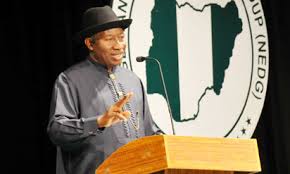L
LequteMan
Guest
Nigeria – Speaking in Washington DC at a session of the Council on Foreign Relation, coordinating Minister for the Economy and Minister of Finance, Dr. Ngozi Okonjo-Iweala, says President Goodluck Jonathan had made moves to stop further depletion of the country’s Excess Crude Account by state governments and parastatals.
She recalled that during her stint as Finance Minister under former president Olusegun Obasanjo, between 2003 and 2006, the need to build fiscal buffers was explored, culminating in the creation of fiscal buffers—Excess Crude Account (ECA).
The ECA, she noted, provided the needed buffers against the shocks then and prevented Nigeria from seeking a lifeline from the International Monetary Fund (IMF) as was done by some nations.
She noted that with the $22 billion left in the ECA, the country was able to withstand the global financial meltdown between 2008 and 2009, when oil prices plummeted to about $40 per barrel from about $147 per barrel.
Okonjo-Iweala regretted that on her return as finance minister in August 2011 under the current administration, the ECA had plummeted to about $4 billion, adding that it was on record that she had mounted a strident but futile campaign on the need to build the buffers again.
Her clamour for the rebuilding of the ECA, she said, was drowned by a cacophony of voices from the federating states to share everything.
The states, she said, had based their insistence on sharing everything in the ECA on the relevant section of the constitution, claiming that the ECA was illegal.
The minister said the administration of President Goodluck Jonathan had gone ahead to create the Nigeria Sovereign Investment Authority (NSIA) to take over the ECA and manage the Sovereign Wealth Fund (SWF).
According to her, this has also become a subject of litigation with the states even striving to stop the NSIA.
She, therefore, urged the incoming administration, on taking over, to quickly build the political consensus among the different tiers of government to enable it rebuild the fiscal buffers and continue to guard against depletion in the future.
#ThisDay #Okonjo #Nigeria #ECA #Jonathan

She recalled that during her stint as Finance Minister under former president Olusegun Obasanjo, between 2003 and 2006, the need to build fiscal buffers was explored, culminating in the creation of fiscal buffers—Excess Crude Account (ECA).
The ECA, she noted, provided the needed buffers against the shocks then and prevented Nigeria from seeking a lifeline from the International Monetary Fund (IMF) as was done by some nations.
She noted that with the $22 billion left in the ECA, the country was able to withstand the global financial meltdown between 2008 and 2009, when oil prices plummeted to about $40 per barrel from about $147 per barrel.
Okonjo-Iweala regretted that on her return as finance minister in August 2011 under the current administration, the ECA had plummeted to about $4 billion, adding that it was on record that she had mounted a strident but futile campaign on the need to build the buffers again.
Her clamour for the rebuilding of the ECA, she said, was drowned by a cacophony of voices from the federating states to share everything.
The states, she said, had based their insistence on sharing everything in the ECA on the relevant section of the constitution, claiming that the ECA was illegal.
The minister said the administration of President Goodluck Jonathan had gone ahead to create the Nigeria Sovereign Investment Authority (NSIA) to take over the ECA and manage the Sovereign Wealth Fund (SWF).
According to her, this has also become a subject of litigation with the states even striving to stop the NSIA.
She, therefore, urged the incoming administration, on taking over, to quickly build the political consensus among the different tiers of government to enable it rebuild the fiscal buffers and continue to guard against depletion in the future.
#ThisDay #Okonjo #Nigeria #ECA #Jonathan


